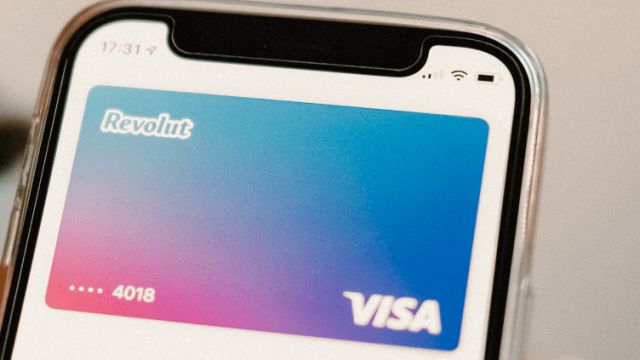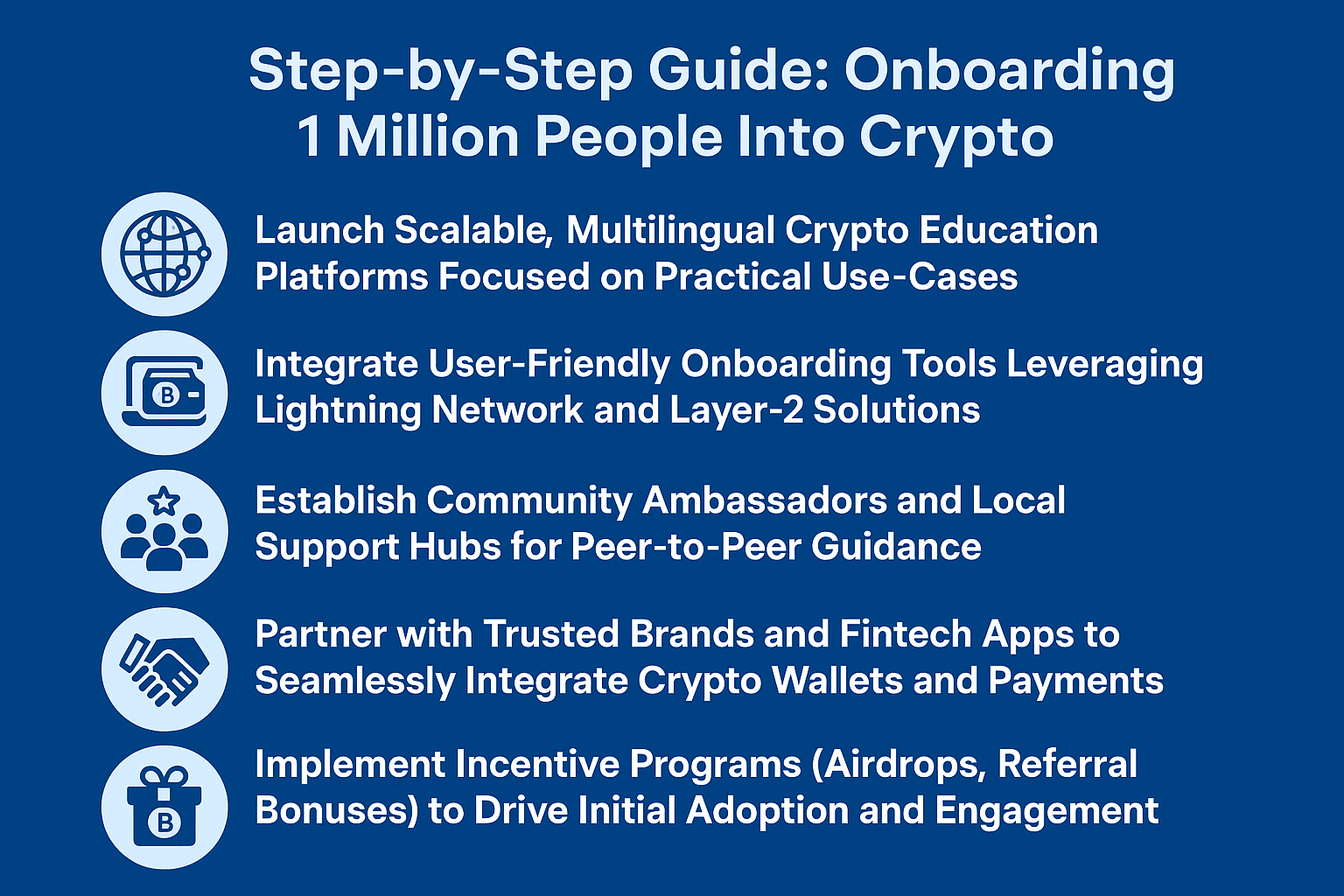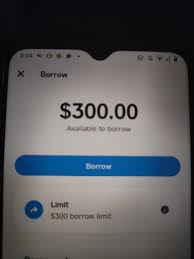Onboarding one million people into the crypto ecosystem isn’t just a moonshot—it’s an engineering and social challenge that requires precision, empathy, and relentless focus on usability. The current landscape is fragmented: while some are drawn to crypto’s promise of financial sovereignty, others are daunted by jargon, clunky interfaces, and security concerns. To bridge this gap at scale, we need a prioritized set of actionable strategies that go beyond hype and address real-world barriers.

1. Launch Scalable, Multilingual Crypto Education Platforms Focused on Practical Use-Cases
Education is the bedrock of mass crypto onboarding. Imagine interactive platforms that teach not just what blockchain is, but how to use it for remittances, savings, or even daily purchases. These platforms should be available in multiple languages—English, Spanish, Hindi, Mandarin—so no one is left behind due to language barriers. Content must be modular and scenario-based: onboarding a gig worker in Brazil requires different examples than onboarding a retiree in Germany. Gamified learning paths and progress tracking can make the process engaging rather than intimidating.
2. Integrate User-Friendly Onboarding Tools Leveraging Lightning Network and Layer-2 Solutions
The next billion users won’t tolerate slow transactions or high fees. That’s where technologies like the Lightning Network (for Bitcoin) and Ethereum’s Layer-2 rollups come in—they make payments fast and cheap without sacrificing security. But technology alone isn’t enough; onboarding tools must abstract away complexity with streamlined sign-ups, instant wallet creation, and clear error messages. Think: a one-click experience to receive your first satoshis or tokens. Integration with existing messaging apps or social logins can further reduce friction for new users.
Top Strategies for Onboarding 1 Million into Crypto
-

Launch Scalable, Multilingual Crypto Education Platforms Focused on Practical Use-CasesLeverage platforms like Binance Academy and Coinbase Learn to provide accessible, practical crypto education in multiple languages, ensuring users understand real-world applications of Lightning Network and Layer-2 solutions.
-

Integrate User-Friendly Onboarding Tools Leveraging Lightning Network and Layer-2 SolutionsAdopt intuitive wallets and apps such as Phoenix Wallet and Breez Wallet, which utilize the Lightning Network for fast, low-fee transactions, making onboarding seamless for new users.
-

Establish Community Ambassadors and Local Support Hubs for Peer-to-Peer GuidanceDevelop ambassador programs like Binance Angels and local hubs such as Bitcoin Meetups to foster peer education, support, and trust within local communities.
-

Implement Incentive Programs (Airdrops, Referral Bonuses) to Drive Initial Adoption and EngagementUtilize proven strategies such as Coinbase Earn and OKX Referral Program to reward new users and encourage community-driven growth.
3. Establish Community Ambassadors and Local Support Hubs for Peer-to-Peer Guidance
No matter how good your tech stack is, nothing replaces human connection during onboarding. Community ambassadors—local crypto enthusiasts trained as mentors—can demystify wallets, answer tough questions about private keys versus seed phrases, and help people recover from mistakes without judgment. Local support hubs (physical or virtual) offer safe spaces for workshops or troubleshooting sessions tailored to cultural context. This peer-driven approach not only builds trust but also fosters organic growth as new users become advocates themselves.
Would you attend a local crypto support hub for peer-to-peer guidance?
One of the key strategies for onboarding more people into crypto is establishing local support hubs with community ambassadors. We’re curious if this approach would appeal to you as a way to learn and get support.
Community-driven support is a force multiplier for crypto adoption. When new users see familiar faces guiding them, the intimidation factor drops dramatically. Ambassadors can host meetups, livestreams, and Q&A sessions in local languages, ensuring no one feels isolated on their crypto journey. As these networks flourish, they create feedback loops—ambassadors learn from real user pain points and relay those insights to developers, resulting in better products and smoother onboarding.
4. Partner with Trusted Brands and Fintech Apps to Seamlessly Integrate Crypto Wallets and Payments
Most people already trust certain apps with their money—think mobile banks, payment wallets, or even ride-sharing platforms. By partnering with these established brands, crypto companies can piggyback on existing trust and user bases. Imagine opening your favorite fintech app and finding a native crypto wallet waiting for you—no extra downloads or complicated sign-ups required.
These integrations must prioritize security and regulatory compliance while offering clear explanations of what’s happening under the hood. The goal: make buying coffee with Bitcoin or sending stablecoins to family as easy as topping up your phone credit or splitting a restaurant bill.
5. Implement Incentive Programs (Airdrops, Referral Bonuses) to Drive Initial Adoption and Engagement
Incentives are rocket fuel for onboarding. Well-designed airdrop campaigns can put real value in users’ hands from day one—sparking curiosity and experimentation without financial risk. Referral bonuses turn every user into an evangelist: if inviting a friend earns both parties some tokens or fee discounts, the viral loop accelerates adoption exponentially.
The key is to tie rewards to meaningful actions: completing educational modules, making first transactions, or helping others onboard through ambassador programs. This not only drives numbers but also ensures users gain practical experience rather than just chasing free coins.
Proven Strategies for Onboarding 1 Million into Crypto
-

Launch Scalable, Multilingual Crypto Education Platforms Focused on Practical Use-Cases: Platforms like Binance Academy and Coinbase Learn provide accessible, multilingual resources and interactive tutorials, helping users understand wallets, transactions, and real-world crypto applications.
-

Integrate User-Friendly Onboarding Tools Leveraging Lightning Network and Layer-2 Solutions: Services such as Muun Wallet and ZEBEDEE use the Bitcoin Lightning Network and Layer-2 protocols to enable fast, low-cost transactions, making onboarding seamless for new users.
-

Establish Community Ambassadors and Local Support Hubs for Peer-to-Peer Guidance: Initiatives like Ethereum Community Hubs and Binance Angels empower local ambassadors to provide hands-on support and guidance, fostering trust and knowledge sharing.
-

Partner with Trusted Brands and Fintech Apps to Seamlessly Integrate Crypto Wallets and Payments: Collaborations such as Revolut x Crypto and Cash App Bitcoin bring crypto access to millions by integrating wallets and payments into familiar fintech platforms.
-

Implement Incentive Programs (Airdrops, Referral Bonuses) to Drive Initial Adoption and Engagement: Successful campaigns like Optimism Airdrop and Coinbase Referral Program have accelerated user growth by rewarding new and existing users for participation and referrals.
Synergy: Building a Cohesive Crypto Onboarding Flywheel
None of these strategies exist in isolation—they reinforce each other in a virtuous cycle. Education lowers the barrier for onboarding tools; local ambassadors personalize support; fintech partnerships normalize usage; incentives spark network effects. The result? A robust ecosystem where one million new users don’t just arrive—they stay, transact, and thrive.




